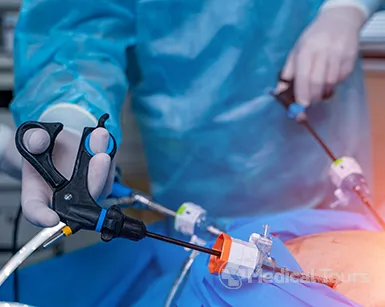Weight loss surgery, or bariatric surgery, is an effective tool for those who are severely obese and have been unable to lose weight through other methods. Bariatric surgery offers a controlled and planned way to lose weight and manage your body mass index after the procedure is completed.
Weight loss surgeries today use minimally invasive techniques and are performed using laparoscopic surgery. These bariatric surgical procedures can cause weight loss by restricting the amount of food the stomach can hold, causing a combination of both gastric restriction and malabsorption. Bariatric surgeries often result in hormonal changes that aid in weight loss. The most common procedures are gastric bypass, sleeve gastrectomy, adjustable gastric band, and biliopancreatic diversion with a duodenal switch.
Obesity is regarded as one of the biggest health dangers in today’s world. If you do not take appropriate preventive steps there are chances that you may be suffering from weight problems in near future. There are many symptoms of obesity which can be used to identify it.
Most often, being overweight or obese is associated with the body mass index (BMI). BMI stands for “body mass index” and is used to measure body weight in relation to height. It can be used to determine whether someone is underweight, normal, or overweight. The National Institutes of Health defines normal weight as a BMI between 18.5 and 25; overweight is considered a BMI between 25 and 30; and obesity as a BMI of 30 or greater.
The patient with a BMI of 35 or more and an increasing trend, of obese patients with obesity-related diseases or conditions are the ones who need bariatric surgery for weight loss. The metabolic actions in these people have changed due to obesity, which results in the overproduction of ketone bodies and other symptoms like acidosis and hyperglycemia. In such patients, surgical intervention is necessary as it helps reverse the metabolic actions that occur because of obesity.
The candidate of bariatric surgery should be in the right age range of 20-40 years. They are expected to have a BMI (Body Mass Index) between 35-40. The candidate should also possess an obesity-related condition such as diabetes mellitus, cardiovascular disease, and hypertension. Bariatric surgery is also suitable for individuals who are 5 or more pounds away from their ideal weight.
A bariatric surgery candidate should be willing to exercise for at least ninety minutes each week. They should also have had short-term success with earlier serious attempts for weight loss. Other important factors include having been overweight for more than 5 years, being able to make lifestyle and eating habit changes and not having an auto-immune disease.
Restrictive Procedure - The Lap Gastric Band
The restrictive surgery is done by placing the band in the upper part of the stomach. This creates a small outlet which limits the amount of food consumed at one time, making one feel full after eating smaller amounts of food. The idea is to decrease daily calorie intake without excess weight gain or loss.
The benefits of gastric band surgery include: the return to normal stomach size is permanent; the recovery period is much shorter than with other options, there is no cutting or stapling of any part of your body and the surgeon can control the size of the outlet.
Roux-en-Y Gastric Bypass is a gastrointestinal procedure that has been used specifically for weight reduction. This surgery is performed through small cuts in the skin. Through these cuts, the stomach's size is reduced, and its shape altered. The Roux limb (estimated to be about 15 cm (about 5.91 in) long) is created and attached to the part of the intestine (called jejunum) which lies beyond the stomach. This way, food entering the stomach bypasses most of it, thus reducing the amount of calories absorbed.
Roux-en-Y Gastric Bypass surgery is a weight loss procedure that creates two smaller stomachs from the large stomach in a person who is severely obese. The large stomach is cut out, with part of it connected to the first part of the small intestine, then reattached. This connection causes food to bypass some of the small intestine so that less food intake can result in weight loss by helping to control appetite and preventing overeating.
The vertical gastrectomy is a surgical procedure to permanently decrease stomach size by removing most of the stomach. This causes weight loss without affecting appetite. The surgery is performed through minimally invasive laparoscopic method, leaving only 5 small incisions. The average weight loss is much greater than the average achieved through gastric band surgery and sleeve gastrectomy.
The most common benefit of gastric banding is that the pouch outlet is easily controlled. This means that the size of the opening through which food passes out of your stomach can be increased or decreased by simply adjusting the band. This technique also means that you will not have an external drain, which some patients find unsightly and uncomfortable.
The surgery, though significant in weight loss, does not guarantee the success for everyone and adherence to healthy lifestyle is necessary to maintain the body weight in long term. For example, Early satiety, a feeling of fullness after eating small amounts of food helps in following a low-calorie diet plan by limiting caloric intake. Prolonged feeling of fullness prevents overeating and helps minimize weight regain.
Bariatric surgery in India is the safest and most effective treatment for weight loss and obesity. The surgery is also known as Gastric Sleeve surgery, sleeve gastrectomy or vertical Gastric Sleeve Procedure. The average cost of bariatric surgery in India starts from (USD 2700 to USD 7200) INR 2,10,000 upto INR 5,60,000.
| S.No. | Surgery | Price in ($) | Price in (₹) |
|---|---|---|---|
| 1 | Gastric Balloon Surgery | USD 2700 | INR 208,000 |
| 2 | Gastric Band Surgery | USD 5000 | INR 371,000 |
| 3 | Sleeve Gastrectomy | USD 6400 | INR 476,000 |
| 4 | Gastric Bypass Surgery | USD 6000 | INR 446,000 |
Additional costs may be incurred, depending on the overall health condition of the patient. These costs can range from medicines to regular evaluations and diagnostic processes (ICU and operation rooms). The cost of your surgery depends on what kind of hospital you choose the room grade and length of stay. Adjust these variables to see how each affects the price.
The cost of gastric sleeve surgery in India varies on many factors such as the number of days required for treatment, the number of people traveling, kind of hospital selected and more. The estimated cost lies between 6000-7000 USD
Yes, all the bariatric surgeries pave the way for a healthy lifestyle which helps the patient achieve good health and fitness through dieting and exercise which they were not able to follow earlier. These are important long-term effects of bariatric surgery and hence it is important that the patients take them as a gift and follow a healthy diet and exercise routine for life.
Since this surgery is a major one, the risks increase with it. Hence, every patient that goes for this surgery must be well prepared to face all the challenges. Diabetes is a major risk factor in any kind of surgery whether it is minor or major and hence it puts risk to such surgeries. However, if you are suffering from diabetes, then you must consider this surgery and your doctor will guide about it further.
After a gastric bypass surgery, the nutritional requirement of your body will change. You will not be able to absorb nutrients from food anymore and so you will need to take supplements containing vitamins and minerals. The doctors can also provide these in form of supplements but you might need to involve with them every year for a checkup as well.
The answer is yes. You will be able to get pregnant after this surgery because the loss of excess weight after the surgery, an increase in the metabolic activities aid your ability to get pregnant.
You can return to work within 3-5 weeks but with some restrictions. For example, you may not be able to lift heavy things or stand for a long time at work. In 3-4 months, you should start feeling well adjusted to the changes in your body and diet.



